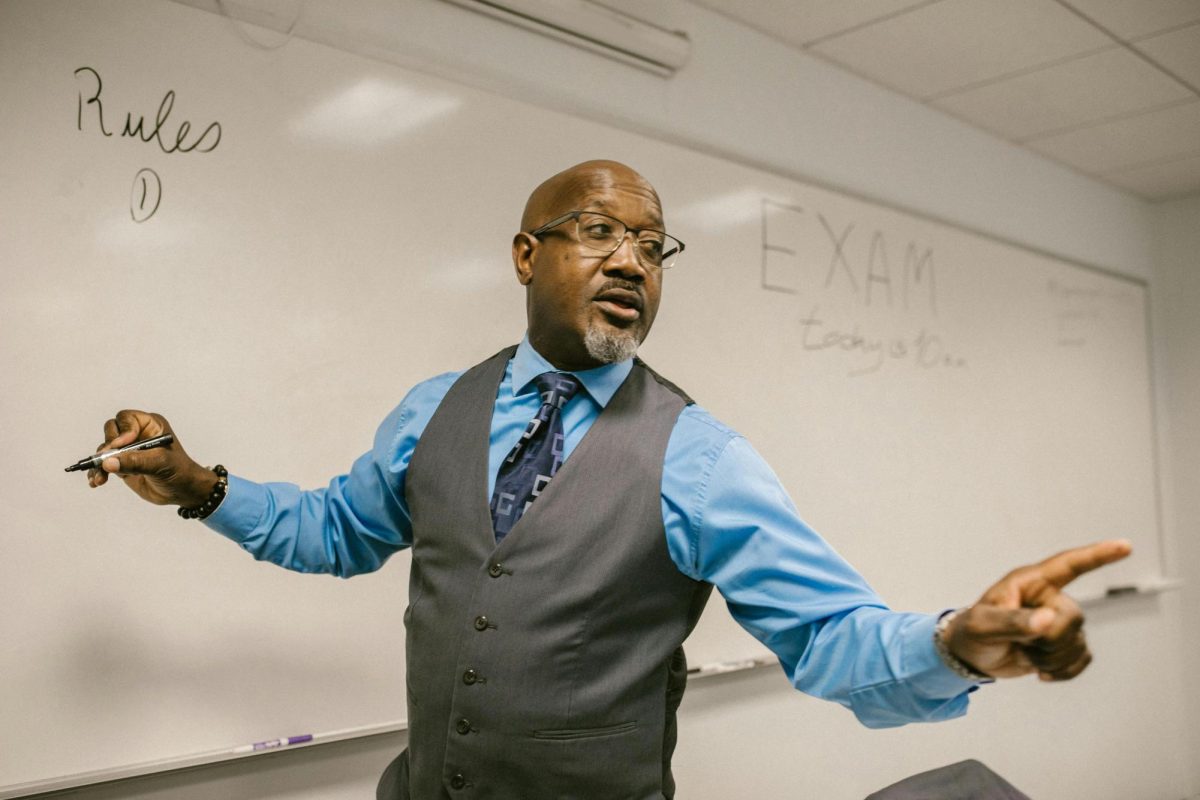Too bad this list can’t be shared with everyone new to the profession. Here are 100 things that might save you some time and headaches, if only you knew when you started.
Our 100 lists of 100
ADVISING:
1. Expect the unexpected
2. Trust your students to maintain a student led environment
3. Do not compare your program to others… it is a thief!
4. Get parents involved – some will donate food, some will donate money, etc.
5. It’s smart to ask for funding for things, even if you have a budget (unless you have a bad administrator who has an “I scratched your back now you scratch mine” mentality).
6. Car washes are a lot of work and not a lot of pay-off.
7. Come up with fundraising ideas together, but keep the work on the kids as much as possible. Example: do a snack sale where parents donate snacks and kids sell.
8. It takes time to build up great examples to work with. When you stop and look around after 8 years, I am so proud of how many examples I have now.
9. Enter contests. Principals love trophies. More importantly, feedback from judging is formative and crucial for improving.
10. Make your classroom a different type of classroom. Make it a place kids want to be.
11. Don’t get into the habit of comparing your book/publication/program with someone else’s.
12. Use creative teaching methods whenever possible, like food to teach design lessons.
13. Celebrate little things along the way, and the big things in big ways
14. Use everything that happens—the
good, bad, ugly and funny—as learning opportunities to make the next one better.
15. You don’t have to act on every creative idea you come up with or come across.
16. Remember that journalism is cyclical: as soon as you finish one episode or issue it is time to start planning and preparing the next one.
17. You need to celebrate your students before you expect anyone else to celebrate them. They are the “Varsity yearbook/newspaper/broadcasting (fill in the blank) team”
18. Building culture is one of the first things you should do – students need to want to be there.
19. Remember that the publication belongs to THEM, not you. (If you hate a decision they make, it’s okay! It’s not yours, it’s theirs.)
20. It doesn’t have to be Publications 24/7. Take time to celebrate, have fun, play games – culture building is important.
21. It will take three to five years after taking over a program for the program to be fully yours.
22. This is your program – allow things you are comfortable with and/or what you can defend to your administration, parents, and community.
23. Yes, this is a lot of work that many will not understand. Take time for yourself – learn when to pull back.
24. Have policies in place (ex. editorial policy, names v. nicknames, hand gestures) as soon as possible to protect both you and the staff.
25. Take your hand off the mouse – let the kids do the work.
26. Have your staff send thank you notes to your admin, secretaries, janitors, coaches–anyone who supports your program. Recipients feel appreciated, and kids learn to take time to thank others.
27. A plate of goodies for the custodian who is waiting to clean the room when you are having a work night will be appreciated and perhaps make a new friend.
28. If you have space in your classroom, have a large calendar on the board/whiteboard for what should be done toward deadlines daily.
29. After you set guidelines together, your EICs are perfectly capable of giving deadline grades.
30. Brag about your newspaper and staffer awards in the district publication or any place you can. It will serve you well when trouble comes to call.
31. Don’t try to fix it all at once. Set an attainable goal for each year (I.e. This year we’re going to make sure all photos have captions and photo credits).
32. You’re not doing it for the pay, but for instilling the most amazing experiences, skills, and memories in impressionable teens, …You are a big deal!
33. If you see something another adviser or program is doing & try to do the same thing but it doesn’t work, that’s okay. Make it your own. Take what works for you & your kids. Our programs are not one size fits all.
34. Don’t be afraid to take chances and follow the crazy ideas. It might be a total flop, but they usually tuen out to be the best ideas. AND, let you kids follow their crazy ideas.
35. You can’t fix everything you find wrong or learn there is all to know right now. This is a marathon, not a sprint. Find 1-3 things to focus on a year at a time.
36. That first year, sit on your hands, watch and observe as much as you can before changing anything with culture, leadership or policy. It will put the kids at ease and you’ll gain their respect.
37. Make it a point of emphasis to recognize your staff for their contributions and achievements.
38. Go home before dark!
39. Get your expectations in writing and signed by parents
40. Have a handle on the finances. Create a budget and follow it. Kids should not handle money, but you can teach them how to budget.
41. Make time to have fun.
42. Build teambuilding into your curriculum.
43. Listen carefully to what your students are saying to you. Be willing to compromise.
44. Set up an area in the room for student leaders and make sure students know what they do and don’t have access to.
45. Get your kids to conventions, workshops, jDays, camp whatever as soon as possible so they can learn from others
46. Invite professionals and other journalism teachers into your room to teach either in person or digitally
47. Always be willing to learn more yourself. Sign up for professional development, attend JEAai or other events that make you a better adviser
48. Be willing to adapt your structure in the classroom. Be open to changing how the course is taught so you can benefit kids.
49. Have resources in your classroom that kids can pick up and read/learn from.
COMMUNITY:
50. YOU ARE NOT ALONE!
51. Ask questions! There are a lot of people who will have the answer. And if they don’t, they will find someone who does.
52. Connect: find other journalism advisers who will understand what you are going through.
53. Being a part of JEA’s mentor program is a great first step.
54. Seek out your state Scholastic Press Association
55. Seek out groups on social media.
56. Your class won’t look or work like the class down the hall
57. You will hear accolades that make you blush. You will receive criticism that seems harsh or unnecessary. Possibly all for the same publication. Be ready for it all. But don’t allow either one to define you or your program’s worth.
58. Get your crew together for a fun holiday photo and send it to your publishers/reps/tech people/admin/parents/anyone else who supports your program.
59. Make sure to attend a convention
60. Conventions are 100% worth the time, money and stress for advisors and their students!
61. Ask JEA or any trusting group and find great resources and you are not the only one.
62. Make time for team bonding! If they love each other, they will work for each other and help each other! If they don’t care about each other, it’s going to bbe a lot harder to ask for favors.
63. Join online groups and don’t be afraid to speak up.
ADMINISTRATION:
64. Make an ally of your administration
65. Don’t be afraid of your administration. If you need to address something, start the conversation and present your plan/points. You demonstrate a lot of knowledge and integrity when you take the initiative and don’t just ask for their input/permission.
66. It’s easier to wait out a bad administrator than I thought.
67. Invite the principal or dean in for a class interview. Make sure the students are prepared with questions the day before. This is great practice especially for a beginning class.
68. People will ask you to do extra things because you end up being the school spirit point-person. It’s okay to say no.
69. If the principal congratulates the football team on the intercom, give him/her the congratulatory announcement to staff to read when they win.
70. Extend grace knowing they do not know your job, classroom, and publications.
71. Take your administrator with you to a workshop or convention. Ask them to present a session with students.
72. Have conversations with your admin from the beginning. Make sure they know what you’re covering before the stories are printed.
73. Be up front with your admin about the benefits of the SPLC.
74. Make your admin understand we all have the same goal: what’s best for students.
FUN FACTS:
75. People say the yearbook is no big deal until it comes out and everyone has an opinion about it.
76. If it hasn’t happened already, someone will suggest you get fired. You won’t get fired.
77. Celebrate Scholastic Journalism Week – Your campus needs to know how big of a deal student publications are.
78. I now shudder to think about all those staffers with exacto knives in their hands “back in the day.”
79. You will proof the book after it’s printed, let it go. Perfection is not the goal.
80. Lede is spelled this way because back in the days when they worked with lead, it was hard to tell the words apart. So they changed the spelling to lede.
81. Remind yearbook students, this is the only class their classmates pay to get the staff’s homework. And the students will keep it for years to come.
82. If advisers do the work, students miss the opportunity to learn
83. The best “fundraiser” is to make a great yearbook
84. Spend your budget on students and experiences, not equipment
85. People first. Then process. The product will come on its own, and kids will rise to meet your expectations.
86. You WILL find mistakes when that book is printed, and you WILL be ok. Mistakes don’t measure worth
87. The first year is the hardest, don’t be afraid to ask questions.
88. You don’t have to stay 12+ hours at work every day… Go Home!
89. Take risks with your kids – participate in the staff dance party during worknight
90. Treat students as responsible young professionals
91. Encourage your kids to do the tough interviews, to work hard to get the press credentials
92. Enter students in National Student Media Contests for the experience
93. Encourge students to shadow a professional or college reporter
94. Thank your students for their hard work
95. Encourage students to check out college programs and scholarships
96. Teach students (and yourself) to always make time for themselves
97. Students will be in the room as much as you will let them. Set parameters and they will meet them
98. Treat students as individuals. Build grading systems that meet individual needs and push students past their baseline.
99. Build the idea of TEAM as much as you can
100. Involve every aspect of your school community in your media








